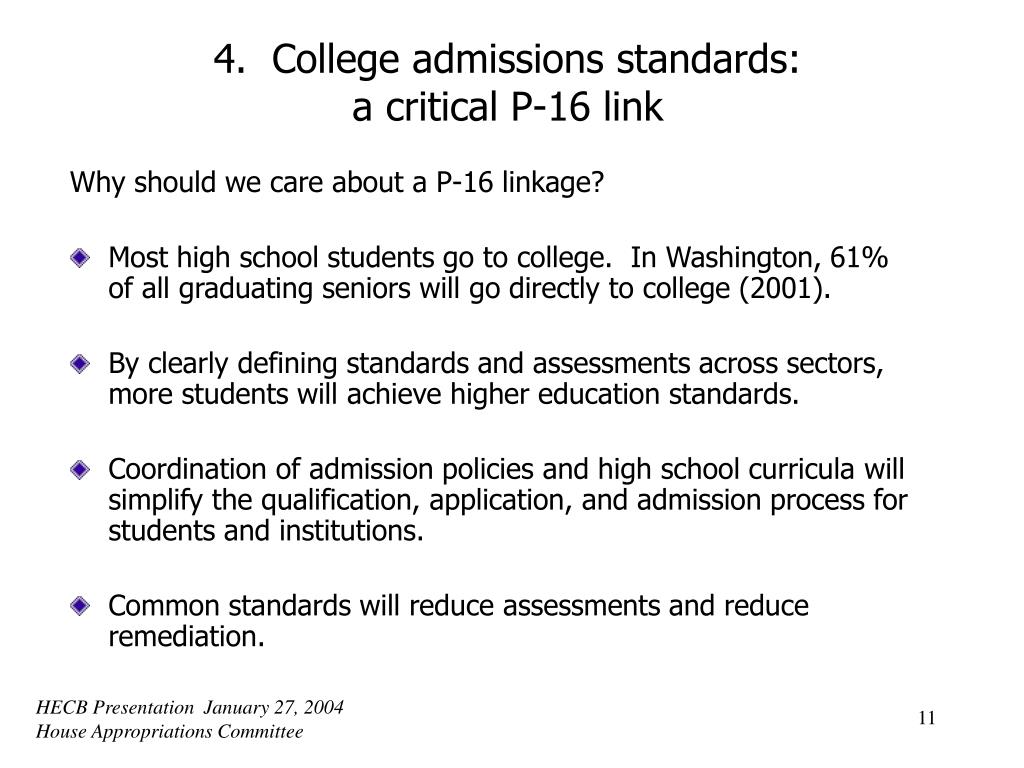Debate On College Admissions Standards And Diversity Policies: A Critical Analysis

Table of Contents
Merit-Based Admissions: A Closer Look
The concept of merit-based admissions forms a cornerstone of many college application processes. However, the very definition of "merit" is often contested.
Defining Merit: What Constitutes "Merit" in College Admissions?
What constitutes "merit" in college admissions? Is it solely academic achievement, or should other factors be considered? A holistic review often includes:
- GPA: Grade Point Average, a numerical representation of academic performance.
- Standardized Test Scores (SAT/ACT): Scores on standardized tests designed to measure college readiness.
- Extracurricular Activities: Participation in clubs, sports, volunteer work, and other activities demonstrating commitment and skills.
- Awards and Honors: Recognition for academic achievements, leadership roles, or exceptional talent.
- Letters of Recommendation: Evaluations from teachers, counselors, or mentors providing insights into a student's character and abilities.
However, the limitations of this approach are significant. Standardized tests, for instance, do not always accurately reflect a student's potential. Socioeconomic disparities in access to quality education and test preparation resources can significantly impact performance, creating an uneven playing field. This raises concerns about the fairness and equity of relying solely on such metrics to determine college admissions.
The Role of Standardized Tests: Are They a Fair and Accurate Measure?
The use of standardized tests like the SAT and ACT remains a central point of contention in the college admissions standards and diversity policies debate.
- Arguments for Standardized Tests: Proponents argue that they provide a standardized measure of academic achievement, allowing for objective comparison of applicants from diverse backgrounds.
- Arguments against Standardized Tests: Critics argue that these tests are biased, do not accurately reflect a student's potential, and disproportionately disadvantage students from underprivileged backgrounds. Test anxiety and access to expensive test preparation resources further exacerbate these inequalities.
Alternatives to standardized tests include portfolio reviews, which showcase a student's work and achievements over time, and interviews, which allow for a more personalized assessment of the applicant. The ongoing debate centers on the predictive validity of standardized tests and the potential for bias inherent in their design and implementation. The search for more equitable and holistic assessment methods is a crucial aspect of the ongoing discussion on college admissions standards.
Affirmative Action and Diversity Initiatives: Arguments For and Against
Affirmative action and diversity initiatives are designed to address historical and systemic inequities in higher education, aiming to create more inclusive and representative student bodies.
Promoting Diversity: The Benefits of Inclusive Campuses
How do diversity initiatives contribute to a richer and more inclusive learning environment?
- Diverse Perspectives in Classroom Discussions: A diverse student body brings a wide range of viewpoints and experiences to classroom discussions, enriching the learning process for all students.
- Preparation for a Globalized Workforce: Exposure to diverse perspectives prepares students for a globalized workforce where collaboration and understanding across cultures are essential.
- Fostering Empathy and Understanding: Interaction with individuals from diverse backgrounds fosters empathy, understanding, and tolerance, crucial for building a more inclusive society.
The educational benefits of diversity are widely acknowledged. A diverse student body promotes critical thinking, problem-solving skills, and a deeper understanding of complex social issues. Furthermore, ensuring representation from diverse backgrounds in higher education is crucial for social justice and equity.
Concerns Regarding Affirmative Action: Addressing Criticisms
However, affirmative action policies have faced significant criticism.
- Reverse Discrimination Arguments: Some argue that affirmative action leads to "reverse discrimination," disadvantaging qualified applicants from majority groups.
- Overlooking Highly Qualified Candidates: Concerns exist that affirmative action may lead to overlooking highly qualified candidates from other backgrounds in favor of less qualified candidates from underrepresented groups.
- Definition of Diversity: The definition of diversity extends beyond race and ethnicity to include socioeconomic status, geographic location, disability status, and other factors. The focus should be on creating a holistic approach that considers all aspects of diversity.
Addressing these concerns requires careful consideration of alternative approaches to achieving diversity without compromising fairness and equity. This includes focusing on socioeconomic factors, geographic diversity, and access to quality education for all students. The debate necessitates a nuanced understanding of the complexities involved and a commitment to achieving a truly representative student body.
The Supreme Court's Role and Recent Legal Challenges
The Supreme Court has played a significant role in shaping college admissions standards and diversity policies through landmark rulings.
Landmark Supreme Court Cases: Shaping the Legal Landscape
Several Supreme Court cases have significantly impacted college admissions policies and the use of affirmative action.
- (List key cases and their impact here, e.g., Grutter v. Bollinger, Fisher v. University of Texas)
These cases have shaped the evolving legal landscape surrounding affirmative action, leading to ongoing debates and legal challenges. Understanding this legal history is crucial to comprehending the current state of the debate.
The Future of Affirmative Action: Ongoing Evolution
What does the future hold for affirmative action and diversity initiatives in higher education?
- Potential Legislative Changes: Ongoing legislative efforts aim to either strengthen or weaken affirmative action policies.
- Alternative Approaches to Promoting Diversity: Colleges are exploring alternative approaches to promoting diversity, such as targeted outreach programs, scholarships, and need-blind admissions policies.
- Ongoing Legal Challenges: Legal challenges to affirmative action are likely to continue, further shaping the landscape of college admissions.
The ongoing evolution of college admissions standards and diversity policies necessitates continuous dialogue, critical analysis, and a commitment to finding equitable solutions that balance merit-based admissions with the pursuit of a diverse and inclusive higher education system.
Conclusion
The debate on college admissions standards and diversity policies remains a complex and multifaceted issue with significant implications for higher education. While merit-based admissions strive for fairness and objectivity, the pursuit of diversity enriches the educational experience and prepares students for a globalized world. Finding a balance between these competing goals requires ongoing dialogue, innovative approaches, and a commitment to creating truly inclusive and equitable access to higher education. Further research and critical analysis of college admissions standards and diversity policies are essential to shaping a more just and equitable future for all students. Let's continue the conversation and work towards more equitable and effective college admissions standards and diversity policies.

Featured Posts
-
 Loneliness Epidemic Key Findings From Dr John Delonys Research
May 19, 2025
Loneliness Epidemic Key Findings From Dr John Delonys Research
May 19, 2025 -
 Eurovision 2025 United Kingdom Secures 19th Position
May 19, 2025
Eurovision 2025 United Kingdom Secures 19th Position
May 19, 2025 -
 Australias Absence Confirmed No Junior Eurovision Participation In 2025
May 19, 2025
Australias Absence Confirmed No Junior Eurovision Participation In 2025
May 19, 2025 -
 Braves Weekend Surge Too Little Too Late In Nl East
May 19, 2025
Braves Weekend Surge Too Little Too Late In Nl East
May 19, 2025 -
 Ecu Parker Byrd Historic First Amputee College Baseball Run
May 19, 2025
Ecu Parker Byrd Historic First Amputee College Baseball Run
May 19, 2025
